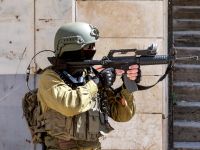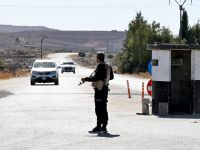Iraq praised its "historic" thaw with Kuwait and Saudi Arabia initiated at the Arab summit, saying Baghdad wanted to forge normal relations with the neighboring state it invaded in 1990.
"The outcome of the Beirut summit was historic where Iraq, Kuwait and Saudi Arabia are concerned. It is beyond description in words," said Iraq's number two Ezzat Ibrahim, who led his country's delegation to the gathering of Arab leaders that wound up in Beirut Thursday.
That outcome was made possible thanks to "the help of Arab brethren, primarily (Saudi) Crown Prince Abdullah bin Abdul Aziz," Ibrahim told reporters on his return home.
Iraq and Kuwait concluded a landmark accord in Beirut, 11 years after a US-led coalition ended Iraq's seven-month occupation, with Baghdad pledging never again to invade its neighbor.
According to AFP, the compromise, which formed part of the final resolutions adopted at the close of the summit, said Iraq's respect for Kuwait's sovereignty would prevent a recurrence of the 1990 invasion which sparked the 1991 Gulf War.
Arab leaders, in their Beirut Declaration, welcomed "the guarantees of the Iraqi government for the respect of the independence, sovereignty and security of the Kuwaiti state and the guarantee of the safety and unity of its territories, in order to avoid anything that could repeat what happened in 1990."
Under the declaration, Iraq was urged "to cooperate in order to find a prompt and final solution to the issue of the Kuwaiti prisoners and missing persons and for its restitution of properties in line with the relevant international resolutions."
The Iraq-Kuwait agreement also opened the way to a thaw between Baghdad and Riyadh, the beginning of which was manifested in a public embrace between Ibrahim and Prince Abdullah before the summit's closing session.
Iraqi Foreign Minister Naji Sabri told the official INA news agency that Baghdad was "optimistic" about its rapprochement with Kuwait. "The future offers an opportunity to restore normal relations and establish ties between two brotherly peoples and countries," he said.
Sabri had made similar remarks in a rare interview with a Kuwaiti newspaper published Friday, in which he said that Baghdad wanted to normalize ties with Kuwait and was willing to help search for those missing in Iraq since the Gulf War.
"We support taking a step forward and establishing a foundation to a situation where we can move on to forge normal ties between two brotherly and neighboring countries," Sabri told Al-Rai Al-Aam.
Sabri reiterated his country's support for Kuwait's prosperity and stability, the Kuwaiti daily reported, but denied Iraq was holding any Kuwaiti POWs.
He proposed however that both sides cooperate to search for those missing. "There are no Kuwaiti POWs in Iraq, and ... we welcome any Arabs who doubt this ... to come with a full team of 1,000 or 10,000 and stay in Iraq for one or two years and search everywhere ... without informing us in advance," he said.
"We are ready for all they think should be done so we can move forward," Sabri added.
Meanwhile, as part of the willing to improve ties, the Kuwaiti citizen Jassem Al-Randi returned home on Saturday, after being held for two weeks by Iraq.
He was arrested when a diplomatic mission strayed across the demilitarized zone (DMZ) into Iraq. Randi, a municipal employee, was accompanying a visiting Venezuelan delegation when their convoy, led by the UN Iraq-Kuwait Observer Mission (UNIKOM), traveled too far across the DMZ on March 15 before being stopped by Iraqi border police.
(Albawaba.com)
© 2002 Al Bawaba (www.albawaba.com)







